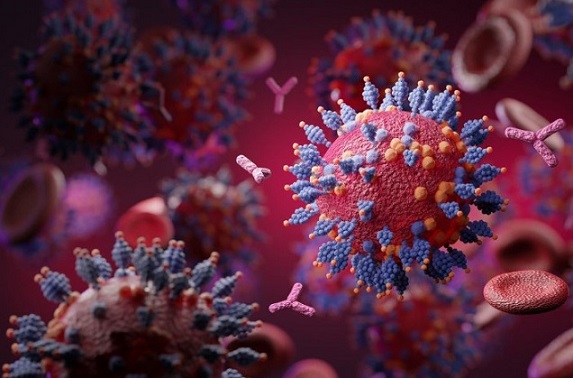Nikhil Prasad Fact checked by:Thaialnd Medical News Team Jul 14, 2024 1 year, 5 months, 2 weeks, 1 day, 12 hours, 55 minutes ago
COVID-19 News: In a recent study, scientists from Zhejiang University-China have delved into the complex mechanisms by which highly pathogenic coronaviruses, such as SARS-CoV-2, SARS-CoV, and MERS-CoV, manipulate host cell death processes to enhance their survival and propagation. This
COVID-19 News explores the intricate interplay between these deadly viruses and apoptosis, shedding light on potential therapeutic avenues.
 The role of coronavirus proteins in apoptosis or cell death
Understanding Apoptosis and Its Significance
The role of coronavirus proteins in apoptosis or cell death
Understanding Apoptosis and Its Significance
Apoptosis, or programmed cell death, is a natural process essential for maintaining cellular health and balance. It plays a crucial role in eliminating damaged or infected cells. However, viruses have evolved to hijack this process to their advantage. Coronaviruses, particularly the highly pathogenic ones, have developed sophisticated strategies to induce apoptosis, thereby aiding their replication and persistence within the host.
Coronaviruses and Apoptosis: A Deadly Duo
Highly pathogenic coronaviruses are equipped with a variety of non-structural proteins that enable them to induce apoptosis through multiple pathways. These proteins not only trigger cell death but also suppress the host's immune responses, creating a favorable environment for viral replication. This article examines the molecular mechanisms through which these viral proteins regulate apoptosis and highlights the implications for disease progression and potential treatments.
Mechanisms of Apoptosis Induction
Coronaviruses induce apoptosis via endogenous and exogenous pathways. The endogenous pathway involves stress signals within the cell, such as DNA damage or endoplasmic reticulum (ER) stress, leading to the activation of proteins like p53, which regulate the transcription of apoptosis-related genes. The exogenous pathway is triggered by the binding of external death ligands to cell surface receptors, activating a cascade of signaling events that culminate in cell death.
The Role of Structural Proteins
The study identifies several structural proteins of coronaviruses that play pivotal roles in apoptosis induction:
-Spike (S) Protein: The S protein of SARS-CoV-2 induces apoptosis by disrupting intracellular calcium homeostasis and activating stress pathways. It also interacts with the angiotensin-converting enzyme 2 (ACE2) receptor, leading to ER stress and cell death.
-Envelope (E) Protein: The E protein can both promote and inhibit apoptosis. In SARS-CoV, it triggers ER stress and mitochondrial-mediated apoptosis by sequestering anti-apoptotic proteins. Conversely, it can also downregulate certain signaling pathways to prevent apoptosis under specific conditions.
-Membrane (M) Protein: SARS-CoV-2's M protein induces apoptosis by interacting with various cellular proteins, leading to mitochondria
l dysfunction and activation of pro-apoptotic pathways. It also inhibits the activation of key survival pathways, promoting cell death.
-Nucleocapsid (N) Protein: The N protein of SARS-CoV-2 has dual roles, promoting apoptosis by upregulating stress pathways and inhibiting it by stabilizing anti-apoptotic proteins. This balance is crucial for the virus's replication cycle and its evasion of the host immune response.
Non-Structural Proteins and Apoptosis
Non-structural proteins encoded by coronaviruses also significantly contribute to apoptosis regulation. Proteins like ORF3a, ORF6, ORF7a, ORF7b, and ORF8 interact with various cellular mechanisms to induce apoptosis, enhancing viral replication and immune evasion. For instance, ORF3a of SARS-CoV-2 activates ER stress and upregulates death receptor ligands, while ORF7a recruits anti-apoptotic proteins to the ER, augmenting apoptosis.
Therapeutic Implications
The insights gained from understanding how coronaviruses induce apoptosis open up new avenues for antiviral therapies. Apoptosis inhibitors, which can block the pathways used by the virus to trigger cell death, show promise in reducing viral replication and alleviating disease severity. Caspase inhibitors, for example, have demonstrated effectiveness in preclinical studies, significantly improving survival rates and reducing lung damage in infected animals.
Challenges and Future Directions
While apoptosis inhibitors hold potential, their clinical application faces challenges due to possible side effects, such as excessive immune activation. Further research is needed to refine these therapies and develop targeted treatments that can effectively block viral replication without compromising the immune system.
Conclusion
The study findings underscore the critical role of apoptosis in the pathogenesis of highly pathogenic coronaviruses. By manipulating cell death pathways, these viruses enhance their survival and replication, leading to severe disease outcomes. The findings provide valuable insights into potential therapeutic strategies that could mitigate the impact of these deadly viruses.
The study findings were published in the peer-reviewed journal: Journal of Biomedical Science.
https://link.springer.com/article/10.1186/s12929-024-01062-1
For the latest
COVID-19 News, keep on logging to Thailand Medical News.
Read Also:
https://www.thailandmedical.news/news/covid-19-news-pittsburg-study-shows-that-sars-cov-2-orf7b-protein-induces-lung-injury-via-c-myc-mediated-apoptosis-and-ferroptosis
https://www.thailandmedical.news/news/study-finds-that-sars-cov-2-n-proteins-are-able-to-suppress-cell-apoptosis-to-facilitate-virus-replication-an-explanation-for-asymptomatic-infections
